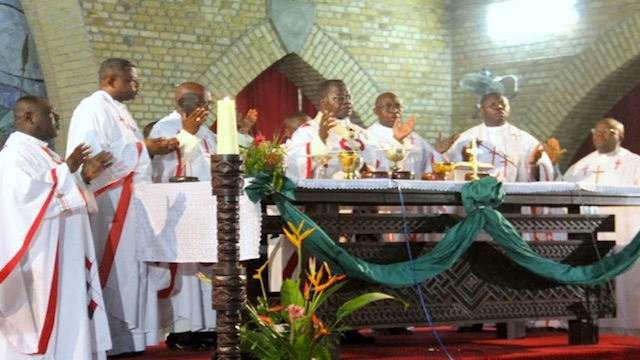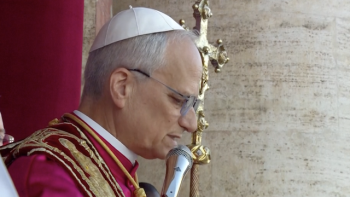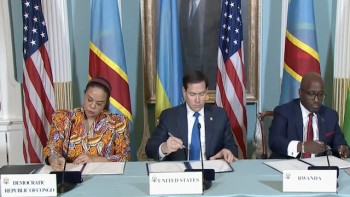On January 27, 2018, AfroAmerica Network reported on the secret meetings in Davos, and then in Addis-Abeba, between Rwandan General Paul Kagame and the delegation of Democratic Republic of Congo (DRC) opposition leaders, Moise Katumbi and Mbusa Nyamwisi. Despite unconvincing, often awkward denials by Moise Katumbi's spokesperson Olivier Kamitatu, to the point of labelling AfroAmerika Network's article "fake news" and by Mbusa Nyamwisi, who denied the Davos meeting, while affirming that he had just arrived in Addis-Ababa, after spending days in Europe, the meetings in Davos and then in Addis-Ababa, between Paul Kagame and the delegation of Moise Katumbi and Mbusa Nyamwisi did happen. Several news media outlets around the World confirmed AfroAmerica Network's report. The question is: what was said in those meetings.
AfroAmerica Network has now received more information from Rwandan sources privy to the secrets of the meetings. The sources revealed to AfroAmerica Network detailed accounts of the discussions between General Paul Kagame and the two Congolese opposition leaders on the sidelines of the World Economic Forum summit in Davos, Switzerland. Initially, the secret meetings were to be concluded in Davos. Neither Moses Katumbi nor Antipas Mbusa Nyamwisi were expected to be invited to Addis Ababa during the 30th African Union (AU) summit.
The invitation to Addis Ababa came as a followup to the interesting and productive discussions General Paul Kagame had with the two opposition leaders in Davos.
During the discussions in Davos, General Paul Kagame, Moise Katumbi, and Mbusa Nyamwisi aligned on following:
- Joseph Kabila is no longer able to withstand the open opposition and criticisim from the Catholic Church. His standoff against the Catholic Church would be politically suicidal for Joseph Kabila. Cardinal Laurent Monsengwo is so powerful that he will certainly overthrow the Kabila regime.
- Cardinal Monsengwo has been openly resentful and critical of Paul Kagame and his regime, for massacring Rwandan Catholic bishops from the Hutu ethnic group and then denying them decent burials. He was the Bishop of Kisangani in 1996 -1997 when AFDL, armed, funded, and reinforced by General Paul Kagame's army, massacred millions of Rwandan refugees and Congolese civilians in Kisangani and all over Estern DRC. He, himself, allegedly narrowly escaped a targeted assassination by Rwandan Patriotic Front soldiers and operatives, embedded within AFDL.
- Moise Katumbi and Mbusa Nyamwisi have the duty to take matters into their own hands and present themselves as an alternative to Joseph Kabila. General Paul Kagame assured them of needed military and political support to get there.
- The two Congolese opposition leaders were overjoyed by the outcome of the Davos meeting. To show his enthusiastic support, General Paul Kagame invited them to Addis-Ababa on the condition of their willingness to accept his terms in return for his support.
- To express his good faith, he issued a formal invitation to these two opponents to come together with him to Addis Ababa to discuss the Congolese crisis at the AU summit, once he is AU President. It was General Paul Kagame's first gesture of political support towards the Congolese opposition.
- Excited about the first success, the Congolese opposition leaders asked General Paul Kagame to invite Felix Tshisekedi and Vital Kamerhe as well, to get more credibility. That's how Felix Tshisekedi found himself in Addis Ababa as Mbusa Nyamwisi later confirmed. Vital Kamerhe declined the invitation.
While in Addis-Ababa, in several interviews with news media about AfroAmerica Network's article, Mbusa Nyamwisi confirmed that he he would gladly meet Paul Kagame whom he viewed as a solution to the DRC crisis.
The Belgian news media La Libre Belgique and the Congolese blog Benilubero published an interview with Mbusa Nyamwisi in which the latter confirmed that he was already in Addis Ababa and highlighted that General Paul Kagame is an indispensable actor and decision maker in the Congolese crisis. Defense et Securite du Congo dissected the implications of the meeting between General Paul Kagame and the DRC opposition leaders.
The French newspaper Le Monde, in an extensive interview with Mbusa Nyamwisi, while still in Europe before heading to Davos and then Addis Ababa, went further about his motivations, his approach to conflicts, and especially his historical inclinations to work with whoever is willing to overthrow Joseph Kabila.
It should be recalled that, as reported by AfroAmerica Network, the meetings with Congolese opposition leaders coincided with the meetings held in Kigali by Rwandan Defense Minister General James Kabarebe with former M23 and FARDC elements and some other young people from North and South Kivu.
AfroAmerica Network asked the sources in Kigali about Paul Kagame's strategy. According to sources the strategy is clear:
- Using his position as the Chairman of the AU, he wants to further weaken the DRC institutions and keep the country under his grip for a long time. Hence, he is pursuing his long proven strategy of promoting conflicts among parties and then encouraging them to tear each other apart, to serve his strategic and business interests. In fact, Paul Kagame has been a close ally of both Moise Katumbi and Joseph Kabila. Hence, it would seem counterintuitive to see Paul Kagame support Moise Katumbi against his long time friend Joseph Kabila, unless there are major interests.
- As soon as the two opposing parties have mutually weakened, the long sought balkanization of DRC would become a reality. The control of mineral resources and the fertile lands of eastern DRC would be easy to achieve and profitable for General Paul Kagame, who reportedly has heavily, but so far covertly, benefited from the resources, through organized proxy militias and looting and smuggling.
- Through the chaos, the strategy of marginalizing the Congolese Catholic Church and especially Cardinal Laurent Monsengwo, who appears to be his sworn enemy, would bet set in motion. General Kagame seeks to weaken, at all costs, the powerful and very respected Catholic Church in DRC, which has so far resisted and escaped his control.
The terms of the agreement between Moise Katumbi and Paul Kagame and the objectives appear clear. Will the strategy succeed?

















